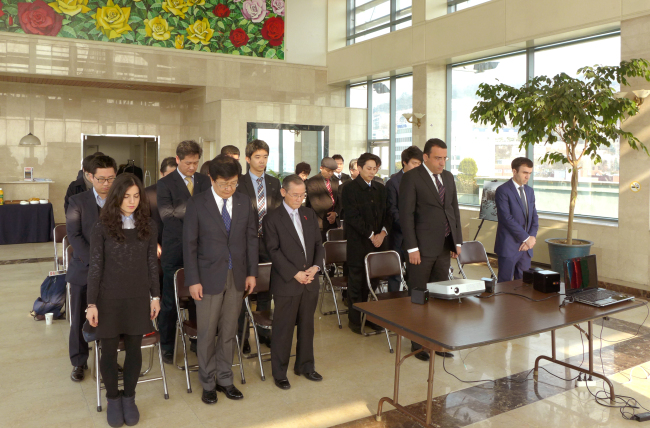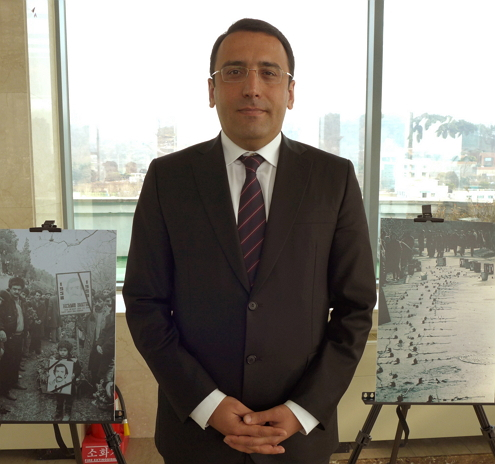
On Jan. 19, 1990, Ilham, an Azerbaijani newlywed, took to the streets of Baku to protest against the Soviet invasion. Unarmed, he yelled, “Stop firing at innocent civilians.” Soviet soldiers shot him dead.
Upon hearing the news of his death, his wife Farida committed suicide later in the evening. Their bodies were cremated together the next day and buried at Martyrs’ Lane cemetery in Baku. 25 years since, their graves have been visited by throngs of lovers and couples.
Ilham and Farida were among 137 Azerbaijanis who died during the Soviet troops’ violent two-day crackdown on the independence demonstration, which later became known as “Black January.”
“Under the authorization of former Soviet leader Mikhail Gorbachev, 26,000 troops and tanks stormed our country and killed, tortured and imprisoned Azeris who demanded independence from the Soviet Union,” Azerbaijani Ambassador to Korea Ramzi Teymurov said in a keynote speech at a 25th anniversary memorial at the embassy building in Seoul last Monday.
Upon hearing the news of his death, his wife Farida committed suicide later in the evening. Their bodies were cremated together the next day and buried at Martyrs’ Lane cemetery in Baku. 25 years since, their graves have been visited by throngs of lovers and couples.
Ilham and Farida were among 137 Azerbaijanis who died during the Soviet troops’ violent two-day crackdown on the independence demonstration, which later became known as “Black January.”
“Under the authorization of former Soviet leader Mikhail Gorbachev, 26,000 troops and tanks stormed our country and killed, tortured and imprisoned Azeris who demanded independence from the Soviet Union,” Azerbaijani Ambassador to Korea Ramzi Teymurov said in a keynote speech at a 25th anniversary memorial at the embassy building in Seoul last Monday.

“The purpose of the heinous attack was to delay the Soviet demise and suppress Azerbaijan’s freedom demands.”
More than 130 people were killed and 800 injured. The event only hastened the Soviet collapse, already set in motion by the glasnost and perestroika reforms, Teymurov said.
The Soviet justification was to “stop pogroms and violence against Armenians in Azerbaijan,” 50 of whom were killed in an ethnic clash a week earlier on Jan. 13. The Azerbaijani Embassy refuted the claim, saying the Soviet militarily intervened to transfer jurisdiction of the Nagorno-Karabakh region from Azerbaijan to Armenia.
Ethnic tensions between Azerbaijanis and Armenians erupted into a full-scale war in 1991. Armenia, backed by the Russian military, gained control of the region.
International organizations such as the U.N. General Assembly, Parliamentary Assembly of the Council of Europe and the Organization of the Islamic Conference have condemned the Armenian occupation, Teymurov said.
In 1994, a cease-fire agreement was signed with no resolution of a peace agreement to date ― a situation similar to North and South Korea, the ambassador added. Through the conflict, over 1 million ethnic Azerbaijanis became refugees and internationally displaced persons.
Gorbachev, who won the Nobel Peace Prize in 1990, apologized to Azerbaijan in 1995 and said, “The declaration of a state of emergency in Baku was the biggest mistake of my political career.”
Azerbaijan has since pursued an independent foreign policy track, one characterized by “pragmatism, restraint and a helpful bias toward integration with the West,” a U.S. diplomatic cable was quoted as saying in a New York Times article on Jan. 9, 2015.
At the same time, Baku’s current relations with Moscow remain “very positive” as a strategic partnership, the ambassador added.
He said that despite the political instability, economic breakdown, social chaos and lack of defense capacity of the early 1990s, Azerbaijan developed rapidly as a sovereign and economically vibrant nation.
The “contract of the century” ― aimed at tapping into the country’s rich deep-water oil reserves ― was signed between Azerbaijan’s state oil company and 13 Western oil companies in 1994.
Azerbaijan is the third-largest ex-Soviet oil producer. The Baku-Tbilisi-Ceyhan pipeline passes through Azerbaijan, Georgia and Turkey for 1,768 kilometers, supplying Azeri crude oil to the European markets.
“We are now trying to diversify our economy by developing non-oil industries,” Teymurov said. “Our government is investing the oil and gas revenues in the information and technology, construction, infrastructure, agriculture and tourism sectors for future growth.”
Teymurov noted that more than 40 Korean companies have participated in various public projects in Azerbaijan in the last five years. Total Korean investment stands at $150 million and bilateral trade volume reached $300 million in 2013.
Interparliamentary and military cooperation has been active, Teymurov added, affirmed by Korean Prime Minister Chung Hong-won’s visit to Azerbaijan last November. Azerbaijani President Ilham Aliyev visited Korea in 2007, and again in 2012 to participate in the Seoul Nuclear Security Summit.
By Joel Lee (joel@heraldcorp.com)
-
Articles by Korea Herald




![[Weekender] Korean psyche untangled: Musok](http://res.heraldm.com/phpwas/restmb_idxmake.php?idx=644&simg=/content/image/2024/05/02/20240502050841_0.jpg&u=)



![[Eye Interview] 'If you live to 100, you might as well be happy,' says 88-year-old bestselling essayist](http://res.heraldm.com/phpwas/restmb_idxmake.php?idx=644&simg=/content/image/2024/05/03/20240503050674_0.jpg&u=)









![[Herald Interview] Director of 'Goodbye Earth' aimed to ask how we would face apocalypse](http://res.heraldm.com/phpwas/restmb_idxmake.php?idx=652&simg=/content/image/2024/05/03/20240503050732_0.jpg&u=)
